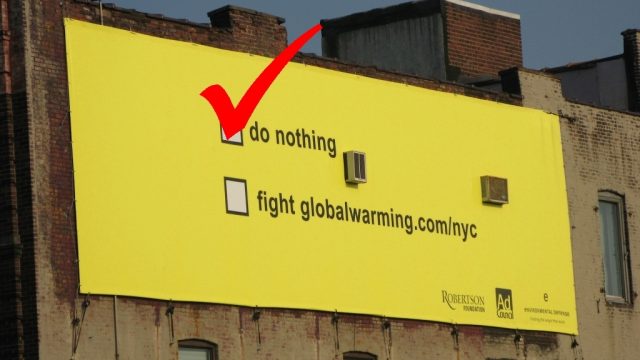In Defense Of Doing Nothing

Earlier today I caught this tweet, re-tweeted on North Dakota Lt. Governor Drew Wrigley’s always amusing Twitter feed, and it provided impetus for something I’ve been wanting to write about for a while. Not because I wanted to pick on the tweeter, or Wrigley, for posting it, but because I think it would be healthier for everyone in America if we stopped believing this sort of thing.
"In a moment of decision the best thing you can do is the right thing. The worst thing you can do is nothing." -Theodore Roosevelt
— Kari Warberg Block (@KariWBlock) February 8, 2014
The Roosevelt quote is of disputed provenance – it’s not clear that Roosevelt actually spoke or wrote the words – but it represents something a lot of people believe, particularly in the area of public policy and most particularly in this age of governance through crisis.
In the Obama years, and the Bush years before them, it seems every public policy issue is a crisis that demands action. Inaction, we are told, is intolerable.
But sometimes, very often I’d argue, doing nothing is preferable to the something the politicians want to do. Put another way, doing nothing is better than doing something that makes things worse.
A case in point for this would be Obamacare. Our pre-Obamacare status quo in the realm of health insurance and health care was not good. Soaring premiums, increasing out-of-pocket expenses and reams of red tape standing between the insured and the care they needed were very real problems. But has Obamacare made it better?
Based on polling, and the way Democrats who are up for election this year are talking about the policy, I’d argue that it hasn’t. Meaning that doing nothing would have been better than the “something” Obamacare represented.
But this runs contrary to how most of the loudest commentators on public policy thing. Especially those in the media with a fetish for bipartisanship. Who think the best possible outcome is a policy with bipartisan support that both the “hard left” and the “hard right” hate. As if merely being in “the middle” were an unimpeachable endorsement of a given policy’s efficacy.
You also hear politicians whose proposed policies are under attack demand to know what alternative policy the attackers are offering. As if that mattered. What policy alternatives there may be is irrelevant in terms of whether or not the policy at hand will, you know, work and stuff.
Our current Congress if often attacked as a “do nothing” Congress. Things have gotten so bad that Senate Democrats went to extraordinary lengths to gut the filibuster for Presidential appointments (and they went further, changing the Senate rules by a simple majority vote), allowing the majority part in the Senate to steam roll the minority. All for the sake of doing more of something.
Personally, I’d prefer to do less something if it means the somethings we do have a broader base of consensus.
There aren’t a lot of people who see the act of policymaking in this fashion, and that’s to the detriment of our country I think.




